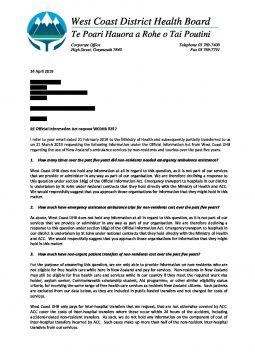RE Official Information Act request WCDHB 9297
I refer to your email dated 21 February 2019 to the Ministry of Health and subsequently partially transferred to us on 21 March 2019 requesting the following information under the Official Information Act from West Coast DHB regarding the use of New Zealand’s ambulance services by non-residents and tourists over the past five years.
1. How many times over the past five years did non-residents needed emergency ambulance assistance?
West Coast DHB does not hold any information at all in regard to this question, as it is not part of our services that we provide or administer in any way as part of our organisation. We are therefore declining a response to this question under section 18(g) of the Official Information Act. Emergency transport to hospitals in our district is undertaken by St John under national contracts that they hold directly with the Ministry of Health and ACC. We would respectfully suggest that you approach those organisations for information that they might hold in this matter.
2. How much have emergency assistance ambulance trips for non-residents cost over the past five years?
As above, West Coast DHB does not hold any information at all in regard to this question, as it is not part of our services that we provide or administer in any way as part of our organisation. We are therefore declining a response to this question under section 18(g) of the Official Information Act. Emergency transport to hospitals in our district is undertaken by St John under national contracts that they hold directly with the Ministry of Health and ACC. We would respectfully suggest that you approach those organisations for information that they might hold in this matter.
3. How much have non-urgent patient transfers of non-residents cost over the past five years?
For the purpose of answering this question, we are only able to provide information on non-residents who are not eligible for free health care while here in New Zealand and pay for services. Non-residents in New Zealand may still be eligible for free health care and services while in our country if they meet the required work visa holder, asylum seeker, Commonwealth scholarship student, Aid programme, or other similar eligibility status criteria, for receiving the same range of free health care services as resident New Zealand citizens. Such patients are excluded from our data below, as they are included in public funded transfers and not charged for costs of services.
West Coast DHB only pays for inter-hospital transfers that we request, that are not otherwise covered by ACC. ACC cover the costs of inter-hospital transfers where these occur within 24 hours of the accident, including accident-related non-resident transfers. As such, we do not hold any information on the component of cost of inter-hospital transfers incurred by ACC. Such cases make up more than half of the non-resident inter-hospital transfers from our services.
Among those inter-hospital transfers for patients who are ineligible, non-residents of New Zealand that we have funded at the outset, and based on average costs that we pay, West Coast DHB has paid an estimated $67,937 overall during the past five financial year periods, from 1 July 2014 to the current 2018/19 financial year-to-date to 28 February 2019. Wherever possible, payment for these transportation costs are sought from the non- resident patient and/or their health or travel insurance company, along with reimbursement of such costs of their health care that they may be provided with.
4. What were the top five most expensive ambulance trips for non-residents?
The top five most expensive inter-hospital non-emergency ambulance trips for patients who are non-residents of New Zealand and not eligible for free heath cares, have all been by pressurised fixed-wing air ambulance aircraft for transfers to tertiary hospitals in other DHB districts (principally Canterbury). As above, wherever possible, payment for these transportation costs are sought from such non-eligible, non-resident patients and/or their health or travel insurance company, along with such costs of their health care that they may be provided with.
The most expensive ambulance trip was $5,981 (excluding GST) for an air ambulance transfer from Greymouth to Wellington; and the next top four after that were air ambulance transfers Greymouth to Christchurch. The average cost of these four trips was approximately $3,800 excluding GST.
5. Which districts had the most expensive ambulance costs for non-residents?
We do not hold any information in this regard to be able to answer your question – this will need to be determined by yourself once you receive the respective responses from other DHBs to your Official Information Act request. We are therefore declining a response to this question under section 18(g) of the Official Information Act.

